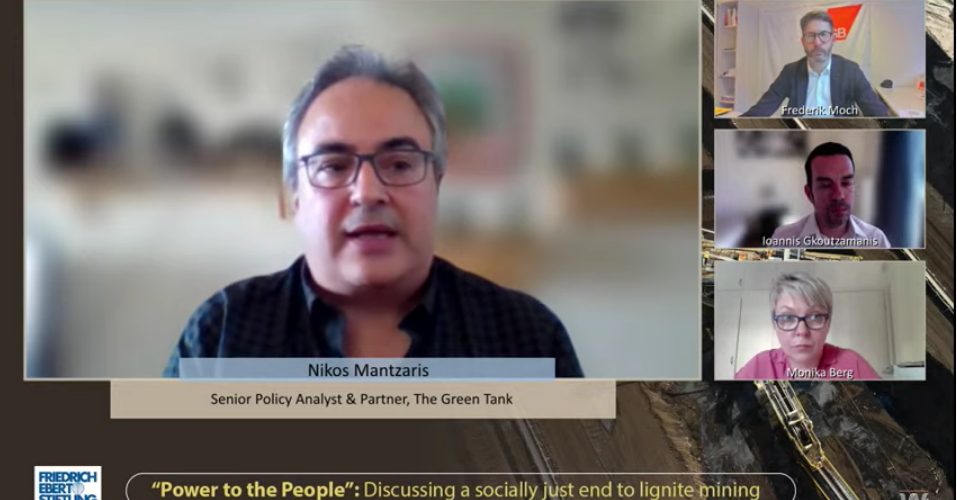Nikos Mantzaris, Senior Policy Analyst and co-founder of The Green Tank, participated in the online event of the Friedrich-Ebert-Stiftung Foundation in Athens titled „Power to the People“: Discussing a socially just end to lignite mining.
In the first segment of his presentation, Nikos Mantzaris referred to the special challenges of the transition in the lignite regions of Greece compared to other EU countries, noting that the degree of dependence of Greek lignite regions – is the highest in Europe. This is reflected both in the higher lignite production per capita and in the higher percentage of workers in lignite mining and burning in the total number of employees in industry overall. Furthermore, Greek lignite regions have the highest unemployment and long-term unemployment rates, which is further exacerbated by the fact that the decline in lignite activity in Greece is the fastest in the EU.
He then referred to the Master Plan, the plan for the transition of the Greek lignite regions, its main elements and the resources available for its implementation, as well as to the “Territorial Just Transition Plans”. On its positive points, Nikos Mantzaris stressed the preservation of the energy character of the lignite regions, through the construction of energy storage infrastructure, mainly batteries as well as a huge new capacity of photovoltaics (2.55 GW).
In addition, the Master Plan also supports small-scale RES for self-generation of electricity by citizens and energy communities as well as for energy storage and self-heating systems.
Nikos Mantzaris underlined the fact that the emphasis on energy communities was not in the original plan, but adopted after consultation with the civil society. The same can be said for the emphasis of the Territorial Just Transition Plans on energy savings, which was also included after several rounds of public consultation.
As far as the funding is concerned, he pointed out that the total dedicated funds for the 2 lignite regions for the period 2021-2027 amount to 2 billion euros without including the use of private funds through the InvestEU facility. Additionally, a share of the annual public revenue from CO2 auctioning is channelled to the lignite regions. From 2018 when the measure was first implemented until 2021, almost 112 million euros have been collected through this source.
In the last segment of his intervention, he outlined the main problems and challenges in the just transition process in Greece, especially in the wake of the energy crisis and the war in Ukraine.
On the negative points of the plan, he pointed out, among other things, that it does not include investments in thermal energy storage exploiting renewables (RES) through the conversion of existing lignite units into storage facilities; a solution that offers the country much needed storage infrastructure to accompany high RES penetration, is fast to construct, and maintains much needed jobs in the lignite industry without however burning lignite. Last but not least, another major problem with the current plan is that the future of district heating in the lignite regions relies exclusively on expensive fossil gas, and not on heat pumps and renewables, which are the only sustainable options in climate terms as well as long term economic viability.
As far as future challenges for Just Transition of Greece’s lignite regions are concerned, he first referred to the “return to lignite” scenarios and the risks they entail both for the country’s climate performance and the economy, due to the rising price of CO2 in the Emissions Trading System. In this context, he cited the recent analysis by The Green Tank, which showed that forward-bearing RES deployment can achieve a much deeper reduction of Greece’s dependence on Russian fossil gas compared to the lifetime extension of lignite plants, both in the short-term, in 2022, as well as in the medium- and long-term, by 2030.
The second major challenge for just transition is directly linked to the centralised, top-down governance mechanisms. Unlike several other governance mechanisms in Europe (e.g. Germany, Czechia, Slovakia), in Greece all decisions are taken centrally, without the participation of local society, civil society and trade unions. This negatively impacts social acceptance of the whole transition process, an absolute prerequisite for its successful outcome.
The event took place on May 12, 2022. Other particpants in the panel discussion included Frederik Moch, Director of the Department on Structual, Industrial and Service Policies at the German Trade Union Confederation, and Ioannis Gkoutzamanis, Energy and Climate Change Policy Officer, Greek General Confederation of Labour (GSEE). The panel was moderated by Monika Berg, Project Manager, FES Athens.
You can watch the video of the event here (in Greek):



















































































































































































































































































































